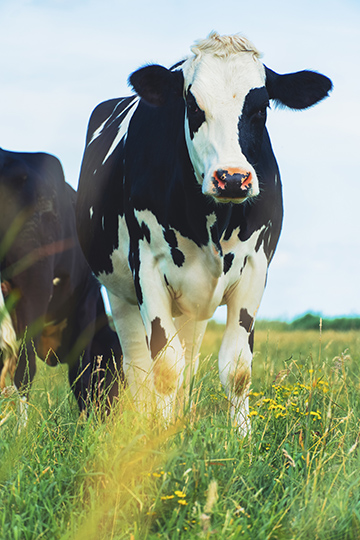
Today’s society is further from their source of food than ever. When people raised their food, they knew what those animals ate and didn’t use chemicals to boost productivity. Today, food might as well be grown on a different planet. A lot happens at factory farms that were never part of farming. Farmers give hormones to animals so they grow bigger or mature faster. There are hormones given to cows to produce 15% more milk, and beef cows get shots to grow to full size 20% faster. Even fish are given hormones to mature twice as fast. We’re eating the treated animals, so does that mean we’re also getting the treatment? Are there hormones in food we should worry about?
Organic pastured beef has become popular.
The FDA has tested the food and agrees that there is no harm in eating the meat from animals given hormones. The limited research results don’t indicate whether it is a problem. One widely used hormone is rBGH—recombinant Bovine Growth Hormone. It boosts milk production in cows. Do these pass on to people consuming animal products? It’s no wonder people are choosing a more natural option for their food, organically grown meat and milk from pastured cattle.
rBGH is in the milk.
The biggest concern about hormones occurs with milk production. Does drinking milk from animals using rBGH increase IGF-1—growth hormone levels? What are the effects of that increase? Does it increase the risk of cancer? Animals given rBGH tend to have more udder infections, causing farmers to give antibiotics. Does the increased use of antibiotics cause antibiotic-resistant bacteria?
rBGH does trigger the production of IGF-1.
rBGH won’t hurt you, but it does trigger the release of IGF-1—insulin like growth factor that may affect your health. The human body produces it, as do cows. The question is whether the rBGH increases it beyond normal levels and whether that can affect humans. There is a link between prostate, colorectal, and breast cancer and high levels of IGF-1 in the blood. Although there’s a link, scientists still don’t understand what that means for health.
- Some evidence indicates that pasteurization does not deactivate the IGF-1 in milk and whether it’s absorbed through the digestive tract. One study suggested that the increase would only be 0.09% of normal daily production.
- Another study identified that even if an infant drank 1.5 liters of milk with IGF-1 protein, it would be less than a 1% increase of the child’s normal daily production and have no effect.
- Concern grew enough to create an outcry in the market. Today you’ll find products labeled rBGH or rBST-free. It doesn’t mean they didn’t use other synthetic hormones raising the animals.
- Large companies like Kraft have now started using milk from cows raised without the use of rBGH in their Natural Cheese product, even though they found no significant difference between the milk from treated or untreated cows.
For more information, contact us today at Hawaii Fit Camp!
